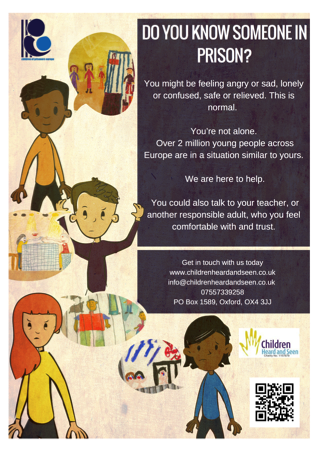Campaign Focus I: Positive solutions for improving prison visits for children
Every June, Children of Prisoners Europe (COPE) holds a pan-European campaign on behalf of children with imprisoned parents entitled, “Not my crime, still my sentence”. Promoting UNCRC Article 12, one of the main goals of the 2017 campaign is to give children a space to communicate their views to prison directors in order to improve the prison visiting experience.
Fostering child participation empowers children to become competent partners in society as both children and as future adults. Giving them a platform to voice their opinions about their experiences visiting prison and to have those opinions heard can improve their relationship with their parents in prison, as well as boost their well-being, self-esteem and development.
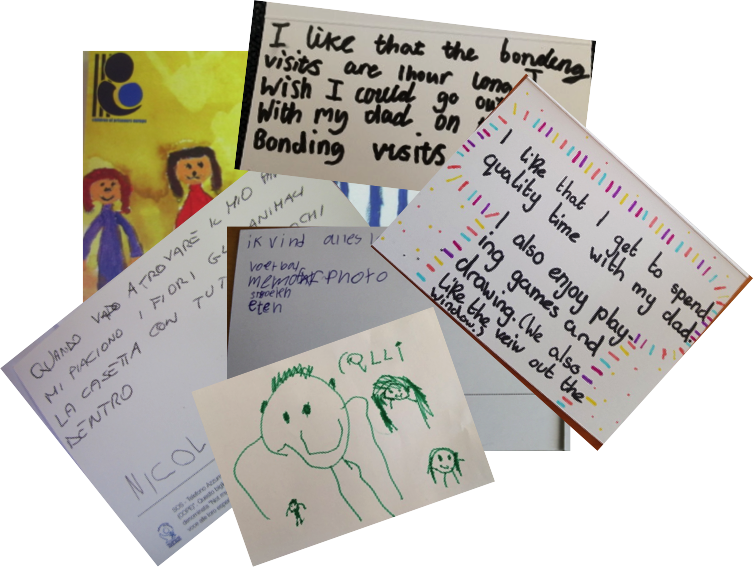
To gather the children’s views, COPE members (in the Netherlands, Poland, Scotland, England & Wales, Italy, France and Sweden) held workshops and discussion groups with children to talk about prison visits. Some children filled out the expression cards during or after a visit. Questions included, “What do you like about prison visits?”, “How do you feel when you visit your parent in prison?” and “What would make visiting better for you?”.
The aim was to move away from the negative language often used in talking about the issues relating to the prison visiting environment for children. By focusing on positive experiences and progressive solutions, the COPE campaign aims to credit good practice initiatives and to focus on solutions co-constructed by prison directors, staff and children. Children all have different experiences of prison visits. Yet there are overlaps in experiences that span across Europe.
Citing long journeys to and from the prison, as well as time wasted waiting in queues for security, many children interviewed wished for more time with their parent and to be able to physically interact with them. In some contexts, prisoner parents are not allowed to leave their chair, nor touch or hold their children. Physical contact, privacy, clear information, a calm atmosphere and shared activities can help children feel at more at ease when visiting their parent in prison.
Now that the cards have been filled out by the children, they are being delivered to the prison directors to better inform the prisons what they are doing well, and things that they can improve upon to continue to improve the children’s prison visits.
We hope that the children’s opinions can provide insight into the positive changes that need to be made to improve their experiences when they visit their parent in prison. By using children’s experiences to influence policy changes, we can better understand and work toward creating a more positive experience for all children visiting their parent in prison.
To view the full list of quotations from children from across Europe, click here.
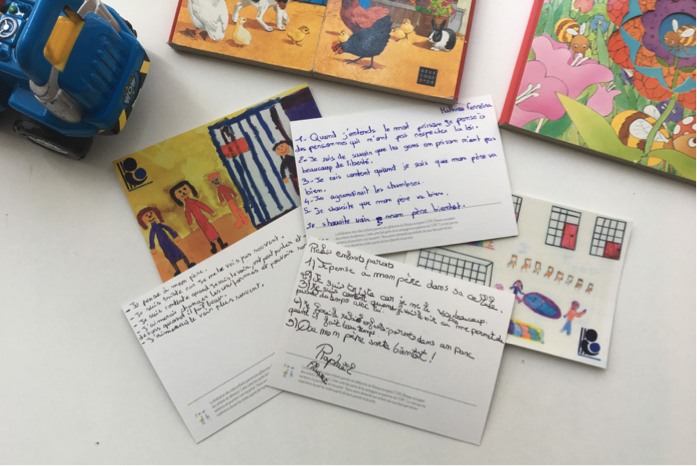
- “I like that Dad can come over and make things with me—usually he has to stay in his seat.” – England / Wales
- “The relaxed atmosphere makes my time with my Mum seem more normal.” – England / Wales
- “I like that I get to spend quality time with my Dad. I also enjoy playing games and drawing. We also like the view out of the window.” – Scotland
- “I like the garden, the games, the books.” – Italy
- “I enjoy doing crafts and making things in the visits for my Dad to take back with him.” – England / Wales
- ***
- “I wish there was a visitors’ centre so we wouldn’t have to wait outside. I would like an outside play area or for the inside to be made to look like the outside.” – England / Wales
- “I wish the place was happier, rather then dull and scary.” – England / Wales
- “I only get to see my Dad once a month, because it is so far from our home.” – Netherlands
- “I wish I could go outside with my Dad.” – France
- “The dogs came too close. It made me scared.” – England / Wales
- “You are not allowed to wear your cardigan or poncho. It would be better if we were told the rules of what to wear before we went.” – England / Wales
- “I would rather go climbing or for a walk with my Mum. But that’s not possible, so I try not to think that this is a prison and that I am just with my Mum.” – Poland
- “I wish visits were longer as I don’t get enough time to spend with my Dad.” – Scotland
- “I want windows and mats and wish I could have a bath with Dad. I wish there were pillows, so that we could build a cosy hut.” – Sweden
- “We have to drive 3 hours in traffic to get up here. It is such a long day. I hate it. Also, when I get up here, I only get to see my Mum for a bit then I have to go again.” – England / Wales
- “I would like to be able to see the whole prison one time.” – Netherlands
- “I would like to change the way we wait in the waiting rooms: it takes too long.” – France
Image
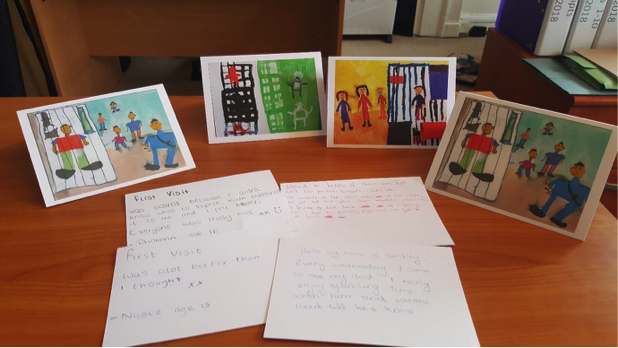
To view the full list of quotations from children from across Europe, click here.
Campaign Focus II: Supporting “out of reach” children of prisoners in the community
Focus II of the 2017 COPE Campaign targeted children who were not already visiting their imprisoned parent and/or who were not yet in contact with COPE’s members for support. Following discussions with the Board and various member representatives on how to reach children in their community via new avenues, we decided to place a particular focus on schools. In the campaign circular for members, COPE made some suggestions as to how to raise awareness in schools, including meeting with a school head teacher, teaching staff and school nurse or counsellor; organising a class, workshop or assembly to speak to children about the imprisonment of a family member; organising a film projection in school; organising a training day for school staff to introduce the topic.
COPE provided posters for schools to nine member organisations in seven countries (Switzerland, Croatia, Netherlands, Poland, Romania, Sweden and the United Kingdom). The posters include children’s artwork depicting scenes from prison, information on potential reactions to a loved one’s imprisonment and contact information for the NGO in the area. All members also received a model letter to translate and send to school managerial staff and a second for National Education Authorities.
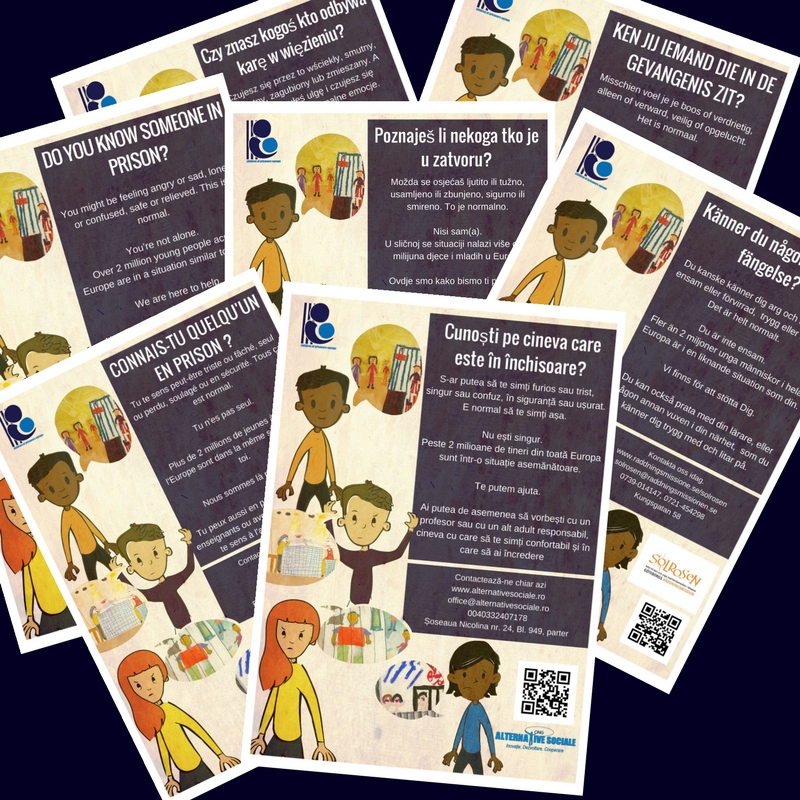
Privacy Recommendations
For a full list of policy changes effected in part thanks to COPE and its members in 2015, please click here.
In 2014, COPE’s Italian partner Bambinisenzasbarre obtained the signature of a national Memorandum of Understanding, an agreement signed by the Italian Minister for Justice, Andrea Orlando, the National Ombudsman for Childhood and Adolescence and Bambinisenzasbarre, which aims to protect and fulfil the rights of the estimated 100,000 children of imprisoned parents across Italy. This charter, applicable in all Italian prisons, was signed for a period of two years and is due to be renewed this June.
“I wholeheartedly welcome the
Italian Memorandum of Understanding. [It] is a remarkable and excellent
initiative. I fully support the laudable results achieved in Italy, and
the efforts underway in Croatia, the Netherlands and Argentina deserve
to be brought to the attention of a wider audience and to be
replicated.”
– Margaret Tuite, European Commission Coordinator for the Rights of
the Child, at “Children with a parent in conflict with the law: What
are their best interests? How can they be met?” 20 May 2016, Zagreb,
Croatia
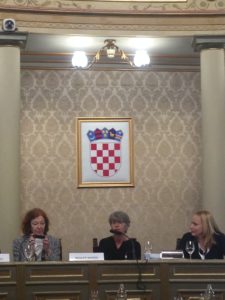
Drawing heavily on the United Nations Convention on the Rights of the Child (UNCRC), the text sets out the rights and procedures agreed upon by the Justice Ministry, the Ombudsman and Bambinisenzasbarre that are necessary to protect the rights and development of children of imprisoned parents. Article 1 covers decisions regarding judicial authorities, who are encouraged to take into account the rights and needs of any underage children of an arrested or detained person who still has parental responsibility, giving priority to alternative measures to pre-trial detention. Authorities are required to provide contact between a pre-trial detainee and his/her child in respect of the child’s rights as laid out in Article 9 of the UNCRC.
The Memorandum also includes the recommendations made by the COPE network regarding visiting conditions and provisions for children of imprisoned parents, such as providing a suitably equipped children’s space in all visiting rooms, complete with resources for babies (bottle warmers, changing tables, etc.) and young children (toys, drawing tables). The signatories also commit to implementing all necessary actions to ensure that the location of the prison for parents of underage children is compatible with guaranteeing direct contact between child and parent during the sentence. The Memorandum also requires that a child be able to visit his/her imprisoned parent within one week of the arrest and on a regular basis from then on.
The Memorandum is an important example of the kind of positive and comprehensive action that can be achieved through lobbying of and partnership with national governments and organisations. COPE believes that the protocol is an important development that can be mirrored in other countries through similar agreements to improve the lives of children at a national level; COPE also believes that the Memorandum has great potential to effect change on a European level.
With this in mind, COPE has produced seven translations of the Memorandum of Understanding, which brings the total number of languages available to eight (see here for a full list of translated versions), in the hope that our members will join us in spreading this example of best practice for the rights of children with imprisoned parents.
Press release
Children of Prisoners Europe launches annual pan-European campaign “Not my crime, still my sentence”
1 June 2017 – Every June since 2010, Children of Prisoners Europe (COPE) has organised a pan-European campaign entitled “Not my crime, still my sentence”, which aims to raise awareness on the issue of parental imprisonment, while promoting positive solutions, targeting key stakeholders using online tools, videos, artwork, communications and social media. COPE is the only network of organisations and individuals across Europe working solely to protect the rights and meet the needs of children separated from a parent in prison.
The objectives of the 2017 campaign include co-constructing positive solutions for improving prison visits for children and supporting “out of reach” children of prisoners in schools.
COPE members are participating in multiple ways throughout the month of June in the Netherlands, Poland, Scotland, England & Wales, Italy, France, Croatia, Switzerland, Sweden and Romania.
Campaign focus I: Improving prison visits for children
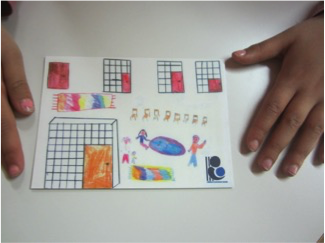
The UNCRC stipulates that all children, including children with imprisoned parents, deserve the opportunity to give their opinions about issues that affect them. The experiences children have during prison visits are no exception. Our first campaign focus includes co-constructing positive solutions for prison visits with prison directors, staff and children. Our members are working with children to illustrate their experiences of prison visits by writing and drawing examples of positive experiences and progressive changes they would like to see. The expression cards the children have been writing on are being sent to directors of prisons where the children visit. COPE’s goal is to move away from the negative language surrounding the “problems” and the “issues” when talking about prison experiences for children with imprisoned parents. A summary of the children’s ideas that prison directors across Europe will receive this month can be viewed here.
Campaign focus II: Support for children of prisoners in schools
Schools can be game-changers for children affected by parental imprisonment. School staff members are often the child’s first point of contact outside of the immediate family, giving them a unique opportunity to meet the child’s needs. Our second campaign focus aids school officials in addressing any issues children of prisoners may face at school and at home. Support from school staff can mean the difference between bullying or discrimination, and social inclusion and security. COPE is providing tools such as posters and teaching aids to schools across Europe to help support children with imprisoned parents. This will allow school staff to reach out to children facing the challenges that come with having a parent in prison in order to support their healthy development and boost school performance.
In 2015, “Not my crime, still my sentence” was awarded the Guardian’s Charity Campaign of the Month. Read Anna Isaac’s article here.
COPE is currently raising money to support its actions in schools: learn more about the project here. To stay informed about the campaign, be sure to check out our website, Twitter and Facebook.


